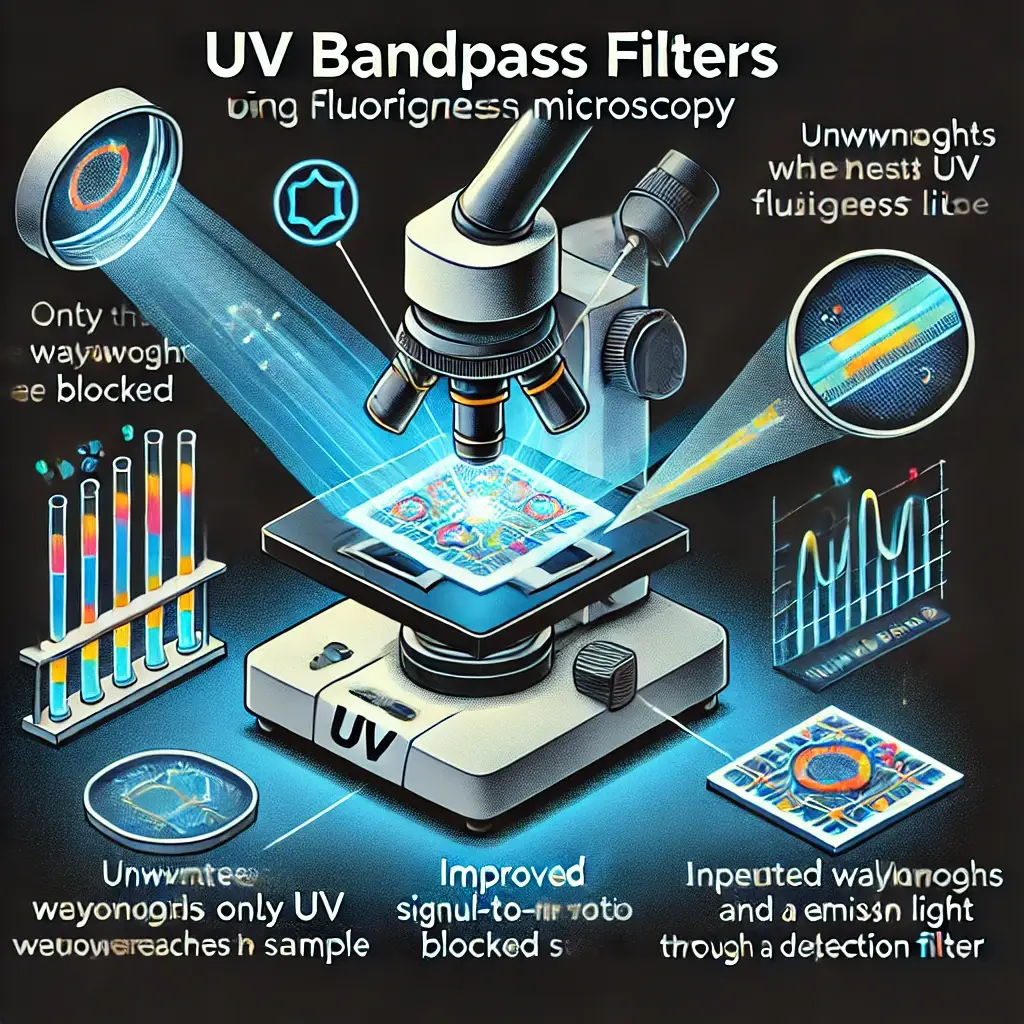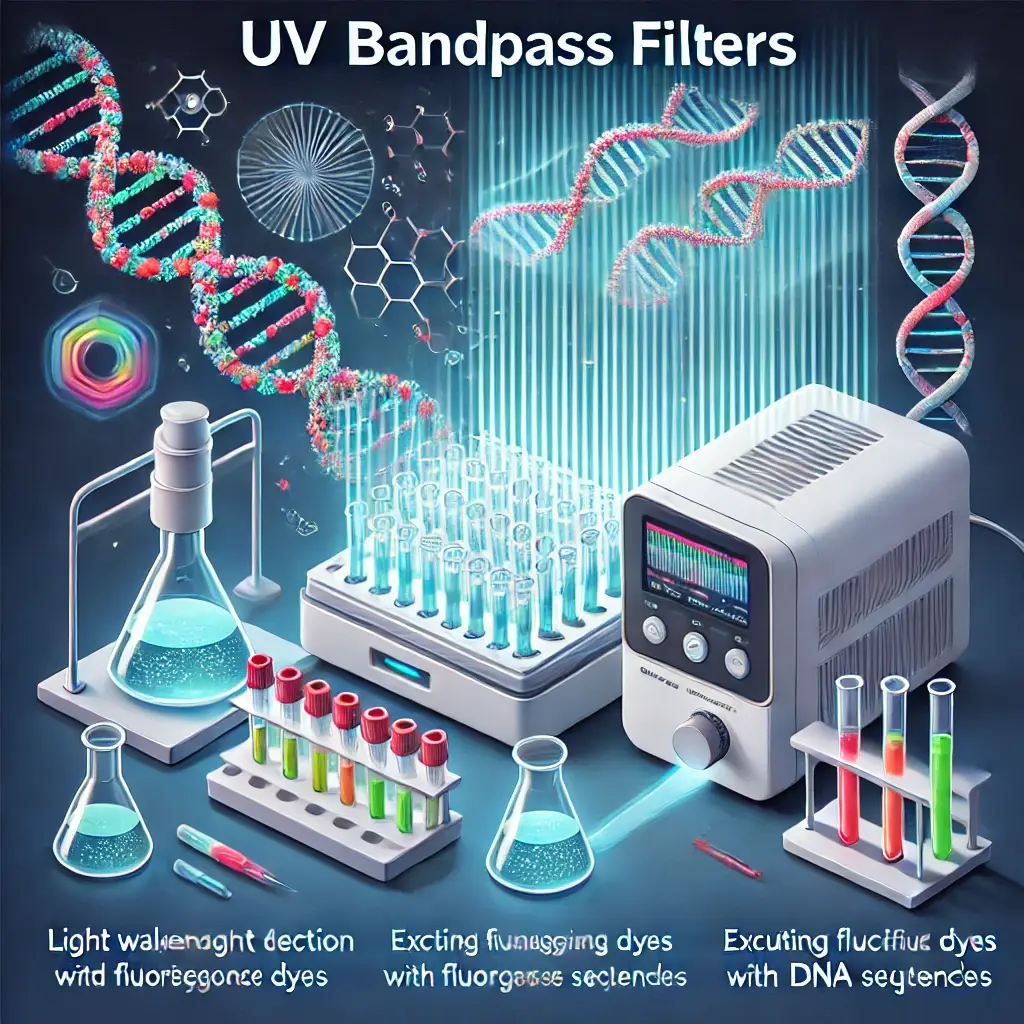UV bandpass filters are designed to provide precision and control in applications that require the isolation of specific UV wavelengths. These filters allow light transmission in a specific UV spectral range while blocking other wavelengths, and are widely used in biomedical research, molecular biology, and diagnostic tools.
Their ability to precisely control the spectrum is key to improving the sensitivity and specificity of various life science instruments.
For more information on UV bandpass filters, please check out this article What is a UV bandpass filter? Which details what it is and how it works.
1. Fluorescence Microscopy and Imaging

One of the most common uses of UV bandpass filters is for fluorescence microscopy, where they help to excite and emit fluorescent dyes or probes. These filters ensure that only the specific wavelength of light needed to excite the fluorophore reaches the sample while blocking unwanted wavelengths that may interfere with signal detection. After excitation, another filter ensures that only the emitted light (from the fluorescent probe) is detected, thereby improving signal-to-noise ratio and image clarity.
For example, in cellular imaging, researchers use fluorescent markers that respond to UV light. UV bandpass filters precisely target these markers, making it easier to observe cellular structures and molecular interactions.
2. Flow Cytometry
Flow cytometry is a powerful cellular analysis tool that uses a UV bandpass filter to analyze the light emitted by fluorescently labeled cells as they pass through a laser beam.
The UV filter ensures that only the appropriate amount of light is detected, allowing researchers to accurately count and classify cells based on their fluorescent characteristics. In immunology, flow cytometry is used to analyze populations of immune cells, while in oncology, it helps identify cancer cells.
3. DNA Analysis and PCR
In molecular biology, UV bandpass filters are essential for DNA analysis, especially in polymerase chain reaction (PCR) systems. During PCR, fluorescent dyes such as SYBR Green are used to detect specific DNA sequences.

UV bandpass filters ensure that only the excitation wavelength of the dye (e.g., 494 nm) reaches the sample and that only the emitted light (e.g., 520 nm) is detected, thereby increasing the sensitivity and accuracy of DNA quantification. This precise control of light is critical in genetic testing and infectious disease diagnosis.
Particularly during the COVID-19 pandemic, PCR instruments equipped with UV bandpass filters were able to detect viral RNA by amplifying specific sequences of the viral genetic material.
4. Microplate Readers
Another application for UV bandpass filters is microplate readers, which are commonly used for biochemical analysis. These instruments rely on filters to measure the absorbance or fluorescence in a well plate and are often used for drug development or enzyme kinetic studies.
By selecting specific wavelengths of UV light, these filters allow researchers to monitor changes in enzyme activity or drug reactions with high precision to better understand biological processes.
5. Forensic and Environmental Sciences
UV bandpass filters also have important applications outside the laboratory, such as forensics and environmental monitoring. In forensics, UV fluorescence can aid in the detection of biological materials that may not be visible under normal lighting conditions, such as blood or other body fluids. UV filters enhance the contrast of such evidence, making it easier to identify and analyze.
In environmental science, these optical filters are used in devices that monitor water and air quality.
For example, UV bandpass filters in water quality monitors help detect pollutants by isolating specific wavelengths absorbed by harmful chemicals. Similarly, air quality monitors use these filters to detect gases such as ozone and nitrogen dioxide, providing essential data for pollution control efforts.
6. OEM Sensing and Imaging
UV bandpass filters are often integrated into customized optical systems for original equipment manufacturers (OEMs). These filters are used in multispectral sensing systems where UV light is needed to detect specific materials or biological agents.
By precisely tuning the UV light, these filters enhance the performance of sensors used in everything from medical diagnostics to industrial quality control.
Conclusion
UV bandpass filters have helped advance biological research and diagnostics from improving the accuracy of fluorescence microscopy to enabling sensitive DNA detection in PCR assays.
As technology evolves, the need for more accurate and efficient optical filtering solutions will continue to grow, making UV bandpass filters even more important for future applications in the life sciences and beyond.
Optolong offers a variety of UV bandpass filters designed for scientific and imaging applications. These filters allow UV light within a specific wavelength range to pass through while blocking other light.
Optolong Optics offers many high-precision, high-efficiency filters suitable for UV photography, fluorescence imaging, and spectral analysis. And they offer filters with customizable sizes and specifications to meet the needs of various projects.
FAQ
What is a UV bandpass filter?
A UV bandpass filter is an optical filter that allows ultraviolet (UV) light within a specific wavelength range to pass while blocking other wavelengths outside of that range.
These filters are used in a variety of applications, such as fluorescence microscopy, spectroscopy, and UV imaging, to isolate certain UV wavelengths for more accurate data collection or imaging. They enhance the performance of systems that rely on UV light by ensuring that only the desired UV wavelengths reach the detector or target surface.
A UV bandpass filter is a type of bandpass filter that is ideal for applications that require precise isolation of UV light, such as imaging and spectroscopy. You can learn more about what bandpass filters are to understand the general principles behind these devices.
How do UV bandpass filters work?
UV bandpass filters utilize thin film coatings or special materials such as quartz to transmit UV light within a specific wavelength range. They block wavelengths outside this range, ensuring that only the desired UV light reaches the target, thereby improving the accuracy of applications such as UV imaging or spectroscopy.
Can UV bandpass filters be customized?
Yes, you can contact the manufacturer of optolong optics online, and they provide customizable UV bandpass filters. You can specify parameters such as wavelength range, filter size, bandwidth, and material to meet the needs of specialized UV applications.
Related reading: Can I custom optical filters?
